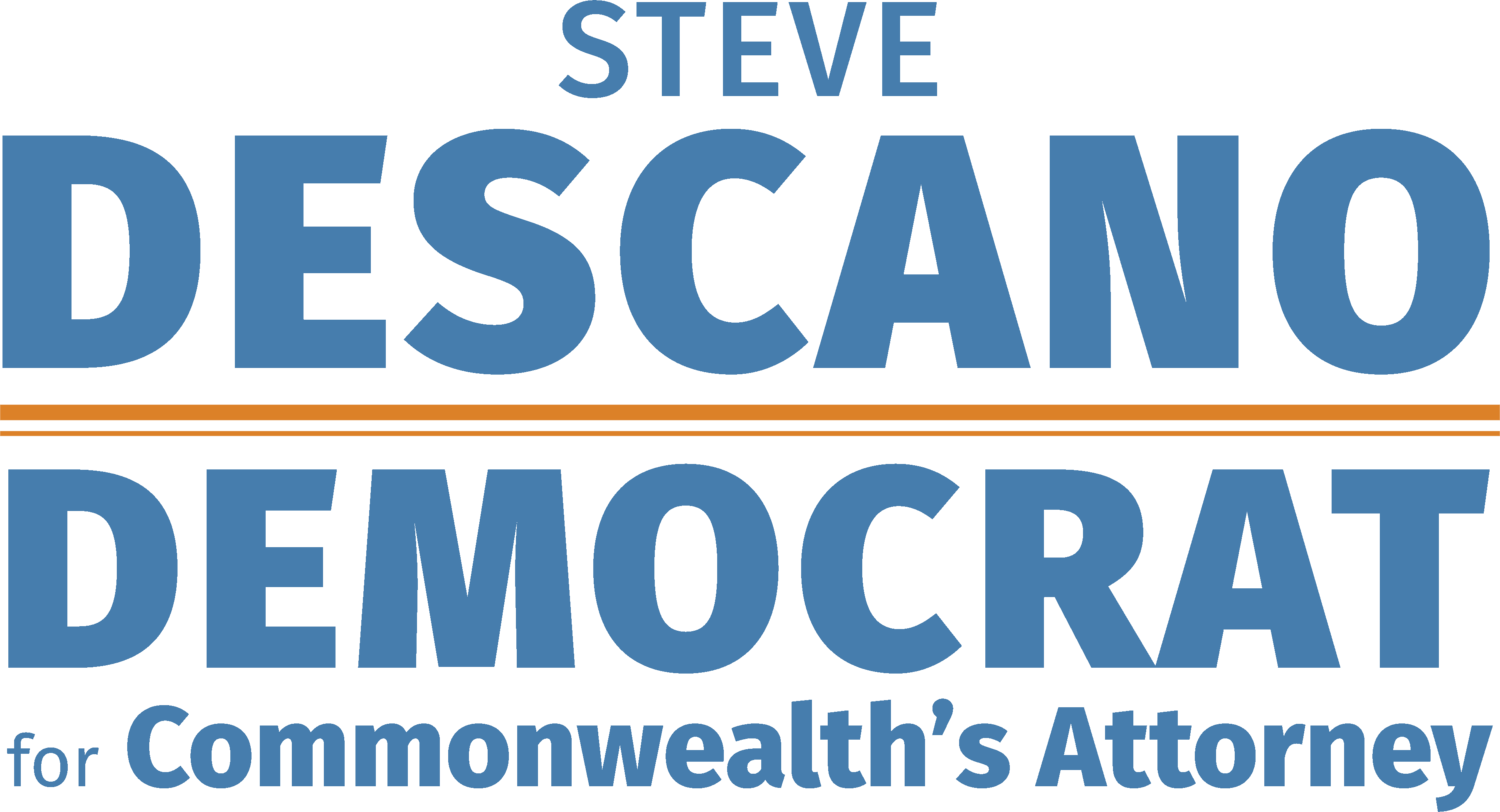Justice
Seeking Justice, not Statistics
A prosecutor’s goal isn’t merely to win cases, they have a higher calling: to seek justice. Steve’s office won’t overcharge individuals or threaten them with charges that carry harsh mandatory minimum sentences just to bully them into guilty pleas. Nor will Steve’s office move forward with charges that are dubious or the product of unconstitutional investigatory acts. Steve’s office will be guided by the same principle he learned as a federal prosecutor in President Obama’s Department of Justice: the prosecution “wins its point whenever justice is done by its citizens in the courts.”
Ending Mass Incarceration
The Commonwealth’s Attorney has numerous tools with which to seek justice. The most severe tool—charging crimes as felonies—has serious secondary consequences that can far outweigh the crimes committed. Although felony charges are warranted for serious crime, unnecessarily creating felons saddles a class of people who them face herculean hurdles to pursuing education, are barred from decent jobs, and lose their right to vote. Simply throwing everyone in jails lands people in a vicious cycle of decreased opportunity, increased poverty, and increased crime that becomes the dominant force in communities where the cycle takes hold. The result is that people living in vulnerable communities end up incarcerated at disproportionate rates. In addition to driving mass incarceration, because the cycle disproportionately affects people of color and low-income people, over-criminalization of our neighbors drives income inequality, the racial wealth gap, and the opportunity gap.
Steve will ensure his office’s charging decisions and plea offers consider the secondary effects of a conviction when determining how best to achieve justice. Over-incarceration takes out productive members of society, forcing them to often leave behind children and family. Steve will look for ways to keep these people contributing to society and connected to their families, while still obtaining justice for victims. Not only does this approach decrease the chances of recidivism, it is a better use of County resources. Jailing someone is the most expensive option in the criminal justice system. Steve will look to use more effective, cheaper options more readily and fight to have the savings invested into programs that break the cycle of decreased opportunity, increased poverty, and increased crime.
Ending the War on Drugs
The War on Drugs has been a resounding failure. It has ruined lives, communities, and disproportionately hurt people of color—all while failing to keep us safe. This failure isn’t a surprise to anyone who recognizes that addiction is an illness, not a crime. We can’t prosecute our way out of a mental health crisis. Instead, we must seek alternatives to criminalizing those who simply need help. People in the grips of an illness are not disposable; they continue to be our neighbors. We should be helping them to make the most of their talents and help move Fairfax forward, not ruining their futures by locking them into a cycle of drug abuse and incarceration.
This is an issue Fairfax County needs to address with bold steps. Fairfax County is not immune to the opioid crisis ravaging Virginia and neighboring states. In the last year, drug arrests by Fairfax County Police increased by 20%. The year before that, drug arrests increased by 26%. Since 2010, drug arrests by Fairfax County Police have increased by 70%, yet drug addiction is still a problem. It’s clear that tough-on-crime approaches have failed. We can no longer rely on failed strategies, and instead must take steps to meet this crisis head on. By getting people the help they need, we can improve their lives, and the lives of everyone in Fairfax County.
Focus on Serious Crime
Steve will use the County’s limited resources in the manner that best achieves community safety. One day of a criminal trial uses the same amount of resources regardless of whether the crime being prosecuted is a low-level offense or a violent crime. A day in jail costs the County the same regardless of whether the person incarcerated is a non-violent individual or a serious felon; however the danger to the community is wildly different. Steve will focus on serious crime and serious criminals, and won’t unnecessarily expend resources on those who don’t pose a danger to the community. Steve is focused on building a safe community, not padding the Commonwealth’s Attorney office’s conviction statistics.
Stop the Unfair and Ineffective Death Penalty
True justice for murder victims gives their families and their communities what they need to heal; it doesn’t give into the base instincts that manifest in the wake of great tragedy. Victims’ families need closure. Communities need outcomes that accord with their values. The death penalty provides neither. The lengthy trial and appeals process designed specifically because of the high risk associated with the death penalty means it takes years for a victim’s family to gain closure: every court proceeding and appeals hearing forces a victim’s family to relive their trauma. The barbarism inherent in the state using its power to take a life and the racial discrimination that typically accompanies the application of that power is an affront to the just, equitable, and forward-looking ideals Fairfax County holds dear.
The death penalty is also ineffective at stopping crime, in addition to being prohibitively expensive. There is no link between the death penalty and community safety. Use of the death penalty is simply an old-school prosecutor’s way to signal to voters that they’re tough-on-crime. Prosecutors who are smart-on-crime know that the money wasted on securing and defending death-penalty sentences would be better used treating drug addicts, providing mental-health services, and funding diversion programs. As a smart-on-crime prosecutor, Steve will make sure your tax dollars are spent on tools that actually increase community safety.
